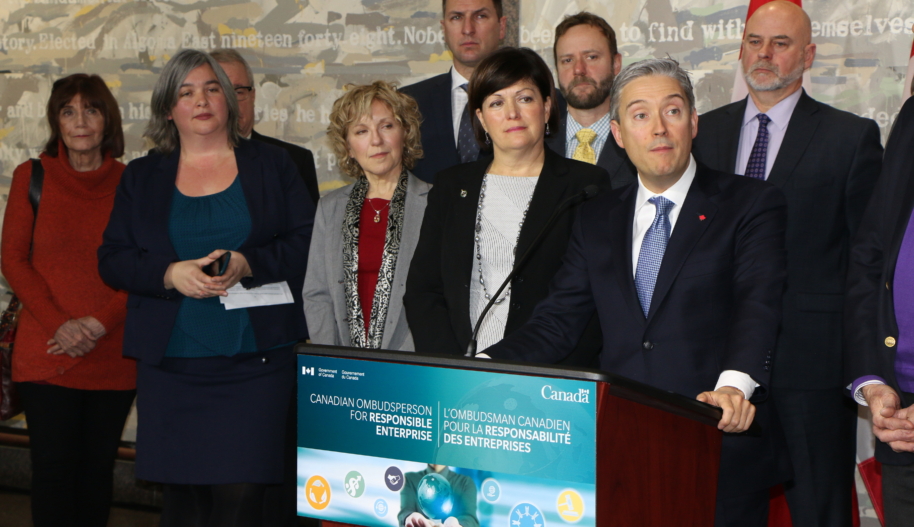OTTAWA – The Canadian Network on Corporate Accountability (CNCA) is greatly encouraged by the Minister of International Trade’s announcement of the creation of a Canadian Ombudsperson for Responsible Enterprise. The human rights ombudsperson will investigate complaints concerning the overseas operations of Canadian companies and will issue public findings on allegations of harm. The office will make recommendations for redress; regarding corporate eligibility for government services; and with respect to policy and law reform.
“Over the years, cases of real concern have mounted, involving worrying allegations that Canadian mining and other companies have been responsible for serious human rights abuses in countries around the world,” said Alex Neve, Secretary General of Amnesty International Canada. “At long last there will be a body and process in place to hold Canadian companies accountable for human rights in their overseas operations.”
“Sexual violence against women – especially Indigenous women – has been associated with Canadian commercial projects overseas,” said Jean Symes of Inter Pares. “This government’s feminist foreign policy needs an ombudsperson who will address the violence that has happened in the past, and work to deter it in the future.”
“Our primary goal in working for the creation of this office has been to ensure access to remedy for the mining-affected people,” said Catherine Coumans of MiningWatch Canada. “In nearly 20 years we have seen the level of human rights abuses and mining-related conflict increase globally as companies push deeper into remote areas and onto the lands of Indigenous peoples.”
“The credibility of this new office depends on its power to access relevant information,” said Karyn Keenan, Director of Above Ground. “The ombudsperson office must be equipped with the tools needed to compel corporate disclosure.”
“Canada’s new corporate accountability watchdog must be transparent and free from political interference when seeking information on company activities that impact local communities,” said Ian Thomson, Extractive Industries Policy Specialist of Oxfam Canada.
“Individuals and communities impacted by Canadian mining operations around the world are counting on this office to prevent and redress human rights abuse by Canadian companies,” said Reverend Jordan Cantwell, Moderator of The United Church of Canada.
“Canadians have been asking for the creation of an ombudsperson since 2006,” said Serge Langlois, Executive Director of Development and Peace-Caritas Canada. “Today’s announcement responds to a decade of actions by over 500,000 Canadians calling on the government to create an ombudsperson.”
“The CNCA wants to ensure that the new human rights ombudsperson has the powers and independence necessary to secure its credibility with all stakeholders, including the overseas communities impacted by Canadian companies,” said Emily Dywer of the CNCA.
An effective ombudsperson office will help position Canada as a global leader in business and human rights.
Backgrounder
10 years in the making
Formed in 2005, the Canadian Network on Corporate Accountability (CNCA) brings together 34 civil society organizations from across Canada. We represent Canadians who are concerned about the environmental and human rights impact of our extractive industry overseas. We support communities, workers, Indigenous peoples, and environmental and human rights defenders from around the world by advocating for policy and law reform to hold Canadian companies to account.
Our Open for Justice campaign, launched in 2013, calls for the creation of an ombudsperson to investigate claims of human rights abuse caused by Canadian extractive companies around the world. Our 2016 model legislation outlines the elements of an effective and credible ombudsperson.
Widespread abuses
Frequent reports of widespread abuse associated with the Canadian extractive sector have created pressure for the government to act. From 2000 to 2015, Canadian mining companies were associated with over a thousand human rights concerns in just 13 countries, including targeted killings, injuries, and threats to human rights defenders. The extractive sector is frequently associated with gender-based violence and violations of Indigenous peoples’ rights.
Need for government action
Home to over 55% of the world’s largest extractive companies, Canada actively promotes international mining activity in the form of political backing from embassies and trade commissions. Government agencies also finance extractive companies through loans and equity ownership.
A decade has passed since industry and civil society leaders issued consensus recommendations calling on the government to create an ombudsperson office. In 2015, the Liberal Party made a campaign promise to create a human rights ombudsperson for Canadian companies.
In June 2017, during its official visit to Canada, the UN Working Group on Business and Human Rights highlighted the need for independent investigations to fill the significant gap that exists between existing mediation mechanisms and the courts.
Elements of an effective ombudsperson
Independent investigation is the core function of an ombudsperson. To effectively investigate allegations of human rights abuse, an ombudsperson requires the authority to summon witnesses and compel the production of documents. An effective ombudsperson must operate autonomously from Global Affairs Canada, including in the administration of its operational budget.
An ombudsperson should issue public reports of its findings, including findings of wrongdoing. She should also make recommendations regarding remedy; harm prevention; corporate eligibility for government support; and policy and law reforms needed to prevent and address corporate wrongdoing.













